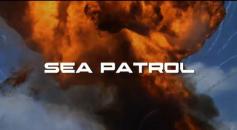
Latest Issues
AbstractHistoryArchive Description
'Young Australians battling the elements to defend Australia’s borders and enforce its economic zone, providing security, surveillance, protection, support and relief for the world’s longest coastline. Our heroes are the officers and crew of Australian Naval patrol boat, Hammersley. Together, they share in the adversity, self-sacrifice and rewards that come with Naval service. Explosive action and monumental stillness. Blue skies and throbbing motors. Mysterious events and deadly consequences. These are the things that characterise SEA PATROL. Everyday heroes doing an extraordinary job.'
Source: Screen Australia. (Sighted: 7/6/2013)
Publication Details of Only Known VersionEarliest 2 Known Versions of
Works about this Work
-
Affairs of the Heart
2015
single work
column
— Appears in: The Advertiser , 3 December 2015; (p. 36) -
Defining a National Brand : Australian Television Drama and the Global Television Market
2011
single work
criticism
— Appears in: Journal of Australian Studies , March vol. 35 no. 1 2011; (p. 33-47)'One option for television drama producers confronted by rising production standards and increasing costs is to become more international in orientation, leading to speculation that national and cultural boundaries may become less important at the higher end of drama series production. Television drama would then become the ‘decontextualised space for universal modes of storytelling’, with lifestyle and reality television formats the more likely vehicles for expressing ‘cultural specificity’. But national and cultural boundaries do matter. The particularities of national television cultures – local policy configurations, historical and cultural influences, technology uptake, the size and wealth of national economies – all impact on the ability of television producers to engage with the global trade in television fiction. This article examines the way in which this global trade internalises and works with national particularities through the sense of a national brand that locates Australian content within a certain value hierarchy. The following discusses three successful examples of internationalised television programming – McLeod's Daughters (2001–2009), Sea Patrol (2007–), and the children's series H2O: Just Add Water (2006–) – that have worked within international perceptions that differentiate Australian content according to perceived cultural sensibilities and national image.'
Source: Abstract.
-
Affairs of the Heart
2015
single work
column
— Appears in: The Advertiser , 3 December 2015; (p. 36) -
Defining a National Brand : Australian Television Drama and the Global Television Market
2011
single work
criticism
— Appears in: Journal of Australian Studies , March vol. 35 no. 1 2011; (p. 33-47)'One option for television drama producers confronted by rising production standards and increasing costs is to become more international in orientation, leading to speculation that national and cultural boundaries may become less important at the higher end of drama series production. Television drama would then become the ‘decontextualised space for universal modes of storytelling’, with lifestyle and reality television formats the more likely vehicles for expressing ‘cultural specificity’. But national and cultural boundaries do matter. The particularities of national television cultures – local policy configurations, historical and cultural influences, technology uptake, the size and wealth of national economies – all impact on the ability of television producers to engage with the global trade in television fiction. This article examines the way in which this global trade internalises and works with national particularities through the sense of a national brand that locates Australian content within a certain value hierarchy. The following discusses three successful examples of internationalised television programming – McLeod's Daughters (2001–2009), Sea Patrol (2007–), and the children's series H2O: Just Add Water (2006–) – that have worked within international perceptions that differentiate Australian content according to perceived cultural sensibilities and national image.'
Source: Abstract.



